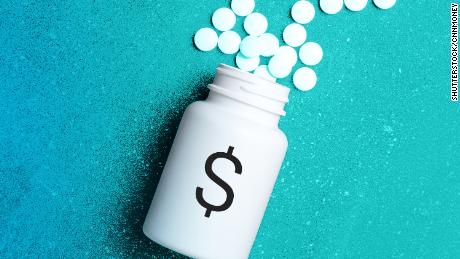(CNN)A coalition of 44 states filed a lawsuit alleging that 20 major drug manufacturers conspired to artificially inflate and manipulate the prices of more than 100 generic drugs.
Drugs named in the lawsuit account for billions of dollars in the United States. They include treatments for cancer, HIV, diabetes, epilepsy and depression, according to a statement released Sunday by the office of Connecticut Attorney General William Tong.
The complaint says that Teva, Sandoz, Mylan, Pfizer and 16 other drug manufacturers schemed to increase prices affecting Medicare and Medicaid, the health insurance market and individuals. The lawsuit also names 15 senior executive defendants responsible for sales, marketing, pricing and operations.
The lawsuit specifies that one report found that prices of more than 1,200 generic medications increased an average of 448% between July 2013 and July 2014.
"During a 19-month period beginning in July 2013 and continuing through January 2015, Teva significantly raised prices on approximately 112 different generic drugs. ... The size of the price increases varied, but a number of them were well over 1,000%," the court document says.
Company representatives regularly met during lunches, cocktail parties, "girls nights out," industry dinners and golf outings and discussed competitively sensitive information, the document states: "Reciprocal sharing of inside information greatly facilitates agreements among competitors ... to avoid price competition."
"We have emails, text messages, telephone records, and former company insiders that we believe will prove a multi-year conspiracy to fix prices and divide market share for huge numbers of generic drugs," said Tong, whose office is leading the coalition of states. "We will not stop until these companies and the individuals who orchestrated these schemes are held accountable."
The lawsuit seeks damages, civil penalties and court actions to restore competition to the generic drug market. The complaint is the second to be filed in an ongoing, expanding investigation.
"The allegations in this new complaint, and in the litigation more generally, are just that -- allegations," Keva spokeswoman Kelley P. Dougherty told CNN. She added that the company "has not engaged in any conduct that would lead to civil or criminal liability" and "is committed to complying with all applicable laws and regulations."
The first complaint was filed in 2016 in US District Court in the Eastern District of Pennsylvania. It includes 18 corporate defendants, two individual defendants and 15 generic drugs. Jason Malek, former president of Heritage Pharmaceuticals Inc., and Jeffrey Glazer, former chairman and chief executive officer of the same company, each entered pleas with the US Department of Justice after being charged with two counts of criminal violations of the Sherman Antitrust Act. Glazer and Malek each will pay a $25,000 civil penalty to the states and cooperate with the states' investigation.
This may be the largest cartel case in the history of the United States, according to Tong.
Responding to the allegations, the Association for Accessible Medicines, an industry group, said that "today's generic drug industry is characterized by intense competition" and that pricing data from the past three years indicate that generic prices have declined overall.
President Donald Trump, who campaigned on a promise to lower drug prices, posted his blueprint for doing so in May 2018. Steps include negotiating better Medicare Part B drug pricing and advancing generics to "boost price competition." During Dr. Scott Gottlieb's tenure as US Food and Drug Administration commissioner, the agency approved a record number of generic drugs.
Get CNN Health's weekly newsletter
Sign up here to get The Results Are In with Dr. Sanjay Gupta every Tuesday from the CNN Health team.
In January, federal filings showed that the lobbying group for the pharmaceutical industry spent about $27.5 million on lobbying in 2018 amid pressure to lower drug prices. This is a record annual total for the Pharmaceutical Research & Manufacturers of America, or PhRMA, which represents most of the nation's largest drug companies, including Teva and Pfizer. PhRMA's previous record lobbying bill topped out at just over $25 million when the industry fought the Affordable Care Act in 2009.








